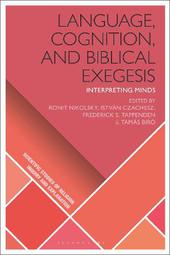
|
Language, Cognition, and Biblical Exegesis: Interpreting Minds
Hardback
Main Details
Description
What role do texts play in religious practice? What is the relationship between these texts and cognition? Are some texts more successful because they are better adapted to our cognitive structures? Why is biblical interpretation necessary, and what is the cognitive process behind it? This book considers such questions, and fills the gap in research on religious texts and narratives in the cognitive science of religion. The study of ancient religions and biblical studies are dominated by textual evidence. However, the cognitive science of religion is lacking significant research on the language and textual interpretation of this literature. This book presents a systematic attempt to redefine the interpretation of religious texts in a cognitive framework, providing concrete textual analysis on a broad selection of biblical passages. It explores the ways that cognitive approaches to language and textual interpretation expand the disciplines of the cognitive science of religion and biblical studies. This book brings together methodology from the cognitive sciences, linguistics, philology, biblical studies, and religious studies, to offer a new perspective for biblical studies and cognitive sciences. It presents a renewed vision of textual interpretation - one that aligns hermeneutical reflection with our cognitive capacities.
Author Biography
Ronit Nikolsky is Assistant Professor of Culture and Cognition at the University of Groningen, Netherlands. Istvan Czachesz is Professor of Biblical Studies at the University of Tromso, Norway, and the review editor of the Journal for the Cognitive Science of Religion. Frederick S. Tappenden is Principal and Dean, and Professor of Theology at St. Stephen's College at the University of Alberta, Canada. Tamas Biro is Senior Research Fellow at the Department for Assyriology and Hebrew at ELTE Eoetvoes Lorand University, Hungary, and an Associate Professor and Vice-Rector of the Jewish Theological Seminary - University of Jewish Studies, Budapest, Hungary.
ReviewsThe editors of Language, Cognition, and Biblical Exegesis enlist an outstanding group of scholars-fluent in both the relevant religious and scientific literatures and languages-to assemble a splendid collection of essays that variously recruit the many methodological, theoretical, and empirical resources of cognitive linguistics, of conceptual metaphor theory, and of the cognitive and evolutionary sciences of religion to insightfully illuminate biblical texts-both Hebrew and Christian--and the cultural settings from which they arose. * Robert N. McCauley, William Rand Kenan Jr. University Professor, Emory University, USA * This book is a significant contribution to the new discipline called cognitive philology. It draws on the combined competences of the cognitive and humanistic sciences to understand the minds behind ancient and biblical texts. It is a treasure trove of studies and applications of cutting-edge science by leading biblical and cognitive science of religion scholars. This is a must-read for all interested in new approaches to ancient texts. * Armin W. Geertz, Emeritus Professor of the History of Religions, Aarhus University, Denmark * In this book, we are confronted with the cognitive turn. The authors challenge us to understand the mental processes that affect the creation, use, transmission, and reception of biblical texts. Their work provides us with a whole new meaning of the word exegesis. Without replacing conventional literary, linguistic, historical, and social scientific outlooks, each author sees the text through the cognitive looking glass. Such a new look helps us to see, like Alice, that what we thought we knew might need to be revised. * April D. DeConick, Professor of Biblical Studies, Rice University, USA, and author of The Gnostic New Age (2016) *
|